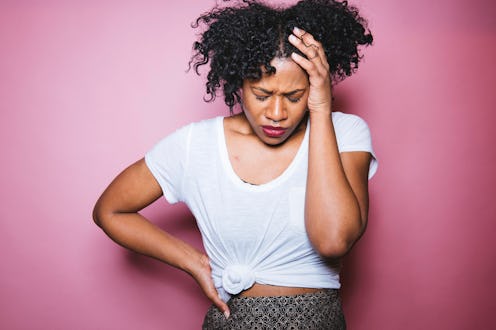
Migraines have been my burden to bear since I was 6. Weather, certain scents, stress, and lack of sleep are all migraine triggers for me. Recently, I've also started to get menstrual migraines. Same? Then you're going to want to learn how to help relieve a menstrual migraine because they're painful AF. According to the Migraine Research Foundation, migraines affect women three times more than they do men. And, some of these migraines can be related to your period. "More severe and more frequent migraine attacks often result from changes in estrogen levels," the foundation's website states. "Research has connected hormones to migraine, but not all migraines are hormonal."
During your reproductive years, you have a chance of being one of the 37 percent of menstruating people who suffer from menstrual migraines, which are migraines that occur before, during, and/or after your period. What's more, some people can experience this type of debilitating migraine for up to five days a month. For me, during the past two months, abrupt weather changes (one of my major triggers) coincided with my period, and I had migraines for several days. "Attacks of menstrual migraine may differ from their other attacks in duration, severity, symptoms, and response to treatment," the Migraine Research Foundation explained on its website. "Estrogen itself is not the culprit. Hormonal fluctuations, and especially estrogen withdrawal, are thought to trigger the attack."
If you don't know the difference between a migraine and a regular headache, migraines are an "extremely incapacitating collection of neurological symptoms that usually includes a severe throbbing recurring pain on one side of the head," according to the Migraine Research Foundation. The best way I can describe it is the feeling of someone hitting the back of your eye with an ice pick over and over again. If you've just started experiencing migraines, it's important to keep a diary so you can determine your triggers. If you begin to notice that your migraines are occurring at the same time every month, it's possible that your migraines are related to your menstrual cycle. Take your diary to the doctor with you so they have all of the information to properly diagnose you.
"A common missed opportunity to improve the lives of our patients is not making the diagnosis of menstrual migraine. It is important to be vigilant in making the diagnosis of menstrual migraine given that it is relatively common, easily missed, and better managed if the diagnosis is clear," Dr. Patrick W. Hullett and Dr. Kasra Maasumi explained on the Neurology Times website. "The key practice point is having all [menstruating] migraine patients keep a headache diary with their menstrual cycle timing. This will increase diagnostic sensitivity for menstrual migraine and also stratify patients according to menstrual cycle predictability for correct management."
Once you determine that you have menstrual migraines, discuss treatment options with your doctor. For some people, oral contraceptives can contribute to migraines because, during the placebo week, your body experiences a sudden drop in hormone levels. However, some oral contraceptives can help combat menstrual migraines. "A dip in your estrogen levels happens before your period triggers menstrual migraine. You can prevent them by taking a steady dose of estrogen throughout your menstrual cycle," WebMD explained on its website. "If you're already on a hormonal birth control pill, switch to a continuous dose. Take estrogen during the days when you'd normally skip pills or take inactive ones."
If you can't, or don't want to, take an oral contraceptive, abortive medications can help stop a migraine in its early stages. However, if you wait to take it until after you already have a full-blown migraine, they're pretty much useless. If your cycle is regular, the Mayo Clinic suggested taking proactive measures to thwart a potential migraine attack, writing, "It's often most effective to take preventive headache medication starting a few days before your period and continuing through up to two weeks after the start of your period." But, overuse of some headache medications can cause what's know as rebound headaches, which is why it's important to consult with your doctor before starting a treatment plan.
If you don't have a doctor, or health insurance, there is a great app called Maven, which serves as a digital health clinic and helps you connect with doctors, who can call in a prescription to your local pharmacy. If you don't have prescription-drug coverage, you can use the GoodRx app to get big savings on prescription medications. Unfortunately, even if you do everything your doctor recommends, there is no magic guarantee that you won't get a menstrual migraine if you're one of the 37 percent of menstruating people who suffer from them.
However, there are some things you can do to make that wicked head pain a little more bearable. Home remedies like migraine-ice hats, heated eye patches, essential oils, caffeine, drinking salt water, acupressure, cayenne pepper, or magnesium and vitamin B2 supplements can all provide some relief, though not every time. My last three-day menstrual migraine landed me in urgent care where I had to get a shot to relieve the pain. While menstrual migraines certainly suck, by keeping a diary and working with your doctor on solutions that are right for you, it is possible to reduce and better manage your attacks. Because, ain't nobody got time to be laid out with migraines several days a month.
Editor's note: This piece has been updated from its original version.